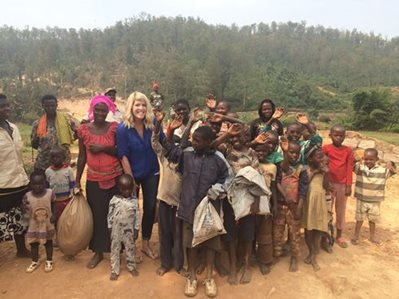Twenty-five years have passed since the 1994 genocide against the Tutsi people in East Africa. Compassion Canada is one of several EFC affiliate organizations working in the area, and as part of our Three Questions Series we observed the anniversary by asking three questions of their president elect Allison Alley, who has seen firsthand the effects of the genocide.
More than 800,000 people were slaughtered during those 100 days. The people of Rwanda will always carry with them the deep loss and scars left behind. But, as Alley points out, love has since been on the move. (To learn more about what other EFC affiliates are doing in the area, visit www.TheEFC.ca/AffiliateSearch and type in "Rwanda.")
Q1: Allison, tell us about what has Compassion been doing in Rwanda over the past 25 years to help to bring hope, healing and reconciliation?
Compassion started partnering with local churches in Rwanda in 1980 to bring holistic thriving to children living in poverty. Today we have nearly 400 Compassion child development centres in the country, each one based in a local church, and serve over 91,000 children and their families.
In the aftermath of the genocide, it became clear that trauma counselling and initiatives that promoted personal and interpersonal healing would be extremely important in our work with children. Many who have come through Compassion’s programs were affected – some had family members killed during the genocide, while others lost parents in the ensuing HIV/AIDS and poverty crises. In response, our church partners have promoted initiatives like art therapy and retreats focused on healing from trauma, particularly among orphaned youth.
Because Compassion’s programs are led by local churches, our church partners are able to lead these efforts in contextual and relevant ways. And of course, they are able to share the hope and peace that Jesus offers. This year, on the 25th anniversary, Compassion Canada invited our supporters to raise funds so that more youth who were affected by the genocide can have access to the support they need through trauma counselling.
Q2: Can you share some stories of children who have made courageous positive choices in that direction?
One example that sticks out in my mind is the story of Monica and her daughter, Josiane. I had the privilege of meeting them during my visit to Kigali in 2016. During the genocide, Monica—who was six months pregnant—tragically lost her husband and two siblings.
After Josiane was born, Monica contracted malaria multiple times and suffered under the weight of abject poverty. She found herself raising Josiane with no job, no income, no family and no support. In her desperation, she even contemplated prostitution in order to provide for her daughter.
| |
|
| |
Affiliate Initiatives
The EFC includes a great diversity of affiliate organizations with stories of ministry worth sharing.
Please contact us to share a story from your affiliate ministry so we can share it too on our website.
Use the custom search on our affiilates page to find out more about what our affiliates do and where they work.
|
| |
|
Josiane was eventually registered in the Compassion program at a local church nearby. Both Monica and Josiane began to feel a sense of hope and community. The church faithfully provided food, education and other needs Monica couldn’t otherwise afford. Today, the tangible impact can be seen in every aspect of Josiane’s life—she had achieved positive growth physically, socially, cognitively and spiritually. The way she is starting to experience the fullness of all she was created to be was absolutely striking to me.
Monica started attending the church, finding a church family who would comfort and pray for her through the ups and downs of her healing journey. It is a community of mutual support—a place where people care for one another practically and prayerfully.
Josiane has since gone on to pursue a degree in IT, and the desperation Monica once experienced is now a distant memory. They both feel empowered and confident in their future, assured by their faith in Christ and vibrant community of their local church.
Q3: What is needed from Canadians to support future healing and growth in Rwanda?
As we seek to support reconciliation efforts in Rwanda, we must first be excellent learners and listeners, and secondly, passionate and sensitive advocates and supporters. Our job as Canadian supporters is to stand beside those who have suffered, listening to their stories and stewarding those stories well—understanding that we have the privilege of learning from them. We can then offer support to local institutions and individuals who are promoting peace. We strive to exemplify this at Compassion by supporting local churches as they lead youth towards healing and forgiveness, as I shared about earlier.
I would encourage Canadians to learn about the issues and learn from the radical reconciliation being lived out by Rwandans. Listen to their stories and move into a role of support that equips institutions like the local church to share Christ’s peace and healing with their neighbours. A practical way we invite Canadians to do that at Compassion Canada is to read the stories of some of our alumni in Rwanda and donate to our trauma counselling fund at www.compassion.ca/rwanda25.
Rwanda photo from 2016 courtesy Compassion Canada.